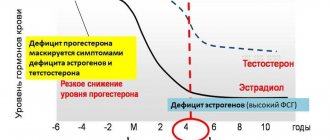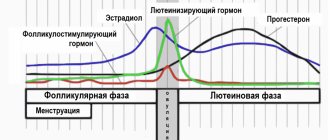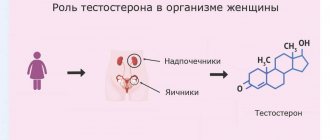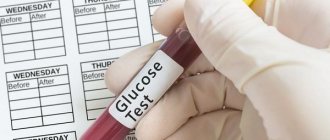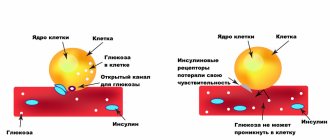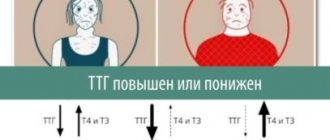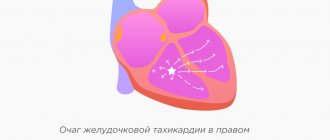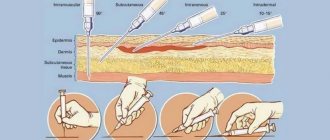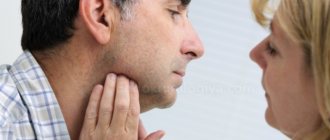What are hormones and where are they produced?
Hormones are substances that are produced in the body in special glands in very small quantities, but have a significant impact on the functioning and interaction of all organs.
Not a single biological process can occur without their participation. Testosterone is a hormone that is produced in the testicles, in special Leydig cells. In the testicles, sperm production also occurs in another type of cell - Sertoli cells. The coordinated work of these two types of cells ensures normal sexual and reproductive function in men.
The process of formation of testosterone (as well as other hormones) is under the control of the central nervous system, namely the pituitary gland - an organ the size of a pea, but whose role is enormous - it is a kind of conductor of the hormonal orchestra of the whole body. The production of testosterone is regulated by the so-called luteinizing hormone (doctors simply call it LH).
What effect does testosterone have on the male body?
The man has not yet been born, and in the seventh week of his stay in the womb, the male sex glands - the testes - are already forming. Another two weeks - and the testes begin to produce testosterone. During the transition period (13-17 years), the boy's testosterone secretion increases sharply, and he gradually turns into a man. How does this happen?
Firstly, under the influence of testosterone, the normal development of a man’s genital organs occurs - the penis, testicles, prostate gland (which, in fact, distinguishes him from a woman) as well as the appearance of so-called secondary sexual characteristics - hair growth on the face and body, characteristic hair growth pubic area.
Body structure: Testosterone promotes the formation of protein in body tissues, primarily in muscles, the growth and development of strength of which is proportional to the amount of testosterone (think about athletes who take “anabolic steroids” in order to have developed muscles). Testosterone is involved in the normal distribution of fat in the body.
In addition, this hormone affects the formation and normal maturation of bone tissue; thanks to testosterone, bone growth zones close in time. The condition of the skin is also directly related to testosterone, since the sebaceous glands function under its influence. Thus, a man’s appearance depends entirely on the amount of testosterone.
The lower timbre of a man’s voice is also the result of testosterone; it is with its participation that the vocal cords thicken during puberty.
Another extremely important function of testosterone is its influence on sexual activity and sexual behavior . Testosterone affects certain areas of the brain, leading to the appearance of sexual desire (libido), not only in men, but also in women.
Normal erection is also ensured with the active participation of testosterone: it has been proven that under its action, complete relaxation of the corpora cavernosa occurs, testosterone contributes to normal blood supply to the vessels of the penis.
Undoubtedly, sexual function and physical development determine a man’s well-being and attitude. However, the role of testosterone is not limited to this. In fact, there is not a single organ system that is not influenced to some extent by testosterone.
The cardiovascular system:
- promotes dilation of coronary vessels
- slows down the process of atherosclerosis
- prevents the development of cardiac hypertrophy in arterial hypertension
- reduces symptoms of coronary heart disease
Urinary system:
- prostate condition
Hematopoiesis: Testosterone affects the maturation of red blood cells (erythrocytes) in the bone marrow.
Central nervous system: Testosterone affects the following processes:
- attention, memory and speed of thinking
- mood (a large amount of testosterone promotes aggressive behavior, a low amount - on the contrary, causes depression)
- spatial orientation
- pronounced antidepressant effect
So testosterone “is what really differentiates men and women, testosterone literally shapes our creativity, intelligence, way of thinking, energy, desire to understand things. It influences and controls not only the potential we possess, but also the benefit we derive from it. It controls our sexual and communicative behavior” (Anna Moir “The Brain of the Sexes”).
FSH (follicle stimulating hormone)
FSH is a pituitary hormone that regulates the functioning of the gonads. In men, it is secreted constantly evenly, in women - cyclically, increasing in the first phase of the menstrual cycle. FSH promotes the formation and maturation of germ cells: eggs and sperm. The egg in the ovary grows as part of a follicle consisting of follicular cells. These cells, during the growth of the follicle, under the influence of FSH, synthesize female sex hormones - estrogens, which, in turn, suppress the release of FSH (negative feedback principle). Indications for the analysis: decreased libido and potency, infertility, anovulation, oligomenorrhea, amenorrhea, dysfunctional uterine bleeding, miscarriage, premature sexual development or delay, polycystic ovary syndrome, endometriosis, growth retardation, chronic inflammation syndrome of the internal genital organs. An increase in FSH levels may indicate insufficient function of the gonads, a pituitary tumor, primary hypogonadism (in men), ovarian wasting syndrome (in women), renal failure, dysfunctional uterine bleeding and other conditions. The analysis will show a decrease in FSH levels with hypofunction of the pituitary gland or hypothalamus, pregnancy, secondary amenorrhea, polycystic ovary syndrome, hyperprolactinemia. Preparation for the study: The analysis is done on the 6-7th day of the menstrual cycle, unless other dates are indicated by the attending physician. 3 days before taking blood, you must avoid sports training. 1 hour before blood collection - smoking. Immediately before taking blood, you need to calm down. Blood is taken from a vein on an empty stomach, lying down.
How does testosterone deficiency manifest?
The effects of testosterone on the body are described above, respectively, deficiency can manifest itself in various symptoms, the most common are:
- depression
- decrease in concentration
- fatigue
- decreased muscle mass and strength
- decreased sexual desire
- erectile dysfunction - problems with developing and maintaining an erection
- infertility caused by a decrease in sperm count
- osteoporosis (cause of brittle bones)
- tides
- reduction in size and soft consistency of the testicles
- anemia (low red blood cell count)
- reduction in prostate size
Why can a man's testosterone levels be reduced in adulthood?
It has been established that testosterone levels in men begin to gradually decline from about the age of 30, by 1-2% every year. As a result, by the age of 50-55 (and in some cases even earlier), the testosterone content can be only about 1/2 of its amount at a young age. In addition, with age, the amount of a special protein in the blood that binds sex hormones increases, which also leads to a decrease in biologically active testosterone. A condition called age-related hypogonadism .
The amount of testosterone in adulthood and old age also depends on genetic (congenital) factors, such as the sensitivity of body tissues to the action of testosterone.
Various diseases of internal organs have an important impact on testosterone levels.
OVEREXCESS OF TESTOSTERONE
This is a situation where more is not better. For an excess of testosterone also negatively affects the physical and mental state of a man. This is expressed as follows:
- excessive body hair;
- hair loss on the head;
- rash, acne;
- excessively high nervous excitability, outbursts of aggression;
- testicular atrophy, testicular atrophy.
Procedure for elevated testosterone levels: examination, then correction.
Platonov Dmitry Borisovich, Chief Physician of NEON Clinic, Urologist-andrologist.
What diseases can lead to testosterone deficiency?
In addition to physiological factors, acute and chronic diseases and medications can lead to hypogonadism, which ultimately increases the age-related decrease in testosterone levels.
Among diseases of internal organs, low testosterone levels can be caused by:
- chronic obstructive pulmonary disease, bronchial asthma
- cardiac ischemia
- arterial hypertension
- diabetes
- obesity
- cirrhosis of the liver
- chronic alcoholism
Testosterone deficiency: causes and treatment
Testosterone is the main male hormone (androgen), which from a young age affects the appearance, sexual activity and well-being of the stronger sex. The substance is produced by the testes, or more precisely by Leydig cells. Testosterone deficiency in a man’s body can lead to serious complications, so the problem must be addressed in a timely manner.
MedEx Personal Medicine Clinic invites you to undergo an examination and determine your hormonal status. We will identify the causes of testosterone deficiency, prescribe treatment, and talk about preventing relapses. The consultation is conducted by experienced general practitioners and urologists.
Functions of testosterone in the body
The word “testosterone” refers to a whole group of steroid hormones of various forms that are strong anabolics. The substances stimulate the synthesis of a huge amount of proteins in the cells of the human body. Testosterone activates the processes of regeneration and tissue growth, penetrates the nuclei and activates more than 146 genes. It’s safe to say that a group of steroid hormones affects not only men’s health, but also the condition of the entire body as a whole.
Causes of testosterone deficiency
The overwhelming majority of clinical cases are age-related changes. Androgen deficiency is observed in men after 30 years, when the production of active substances slows down by about 1% annually. Over the age of 40 years, the level of hormone synthesis drops by 1.5% per year, which is associated with a decrease in reproductive function.
Other possible causes of testosterone deficiency:
- surgical removal of the testicles for medical reasons;
- bad habits: smoking, drinking alcohol, psychotropic substances;
- sedentary lifestyle, sedentary work;
- unfavorable environmental conditions in the area of residence;
- working with hazardous and harmful production factors, toxic substances;
- hypertension, cardiovascular diseases;
- taking medications (opioids, corticosteroids, ketoconazole, hormones) without medical prescription;
- high levels of bilirubin, which destroys testosterone;
- renal failure;
- endocrine diseases, pathologies associated with hormonal imbalances;
- obesity, diabetes mellitus;
- past inflammatory diseases, infections;
- increased levels of lipoproteins in the blood;
- genetic pathologies, for example, Down syndrome, Kallman syndrome, Klinefelter syndrome.
In addition to physical factors, a lack of testosterone can also be caused by psychological reasons. If a man is constantly stressed or depressed, adrenaline actively enters his blood. This hormone is able to block testosterone, even if the androgen is produced in sufficient quantities.
Symptoms of testosterone deficiency in men
Signs of hormone deficiency depend on the cause. If testosterone synthesis slows down due to genetic abnormalities, then a man exhibits pronounced external symptoms of deficiency:
- formation of the genital organs according to the female type, accumulation of adipose tissue in the waist area;
- underdevelopment of the penis and testicles;
- true or false hermaphroditism (the patient has both female and male external genitalia).
Characteristic signs of hormone deficiency in adolescence are slow growth of the genital organs and slender physique. The boy's figure develops according to the female type. His hips become wide, his legs are full, and there are no secondary male sexual characteristics. One of the symptoms of testosterone deficiency is the absence of voice breakage.
Hormonal imbalance also affects the character of an adult man. Symptoms of testosterone deficiency include behavioral characteristics:
- increased emotionality, sentimentality, mood swings;
- sleep disorders;
- depression, tearfulness, moodiness, suicidal mood;
- scattered attention, inability to concentrate on one thing.
Symptoms of testosterone deficiency in men in adulthood include lack of muscle growth, hair loss on the chest, head, arms and legs, enlarged mammary glands (gynecomastia), increased sweating, and metabolic disorders. On the part of the heart, low levels of hormones are manifested by arrhythmia, tachycardia, hot flushes, and cardialgia.
As the deficiency progresses, the patient begins to experience difficulties in intimate life. Symptoms of testosterone deficiency in a man can be decreased potency, sexual impotence, premature ejaculation, and infertility.
Diagnosis of pathologies
As soon as the first signs of testosterone deficiency appear, a man needs to undergo a comprehensive examination. Diagnosis of deficiency begins with laboratory blood tests to determine the concentration of hormone forms in nmol/ml.
The biomaterial is examined using the enzyme immunoassay method. A substance based on an enzyme is added to the blood, which gives testosterone a bright color. Based on the intensity of the shade, the level of different forms of androgen in the blood is calculated. The enzyme immunoassay method is accurate, fast, and false results are excluded.
Three types of testosterone are determined in the blood:
1. Free - the active form of the hormone responsible for the manifestation of male sexual characteristics. In the total volume of androgens, the share of such testosterone is no more than 2%.
2. Bound - a form connected to globulin (SHBG) and albumin.
3. Total - the total value of free and bound hormone.
If, in the presence of obvious signs of testosterone deficiency, the analysis shows normal, the man is prescribed additional blood tests:
1. Determination of globulin level. This protein binds and blocks androgens. The higher the amount of globulin, the lower the concentration of testosterone in a man. Androgen deficiency in the analysis develops with endocrine diseases, diabetes mellitus, and severe liver dysfunction.
2. Determination of LH and FSH - gonadotropic hormones. Substances are synthesized by the pituitary gland and affect the production of androgens in the male body. When testosterone levels decrease and at the same time a decrease in the concentration of LH and FSH is observed according to the results of the analysis, the cause of the deficiency must be sought in the work of the pituitary gland or hypothalamus. Proper treatment will help restore the balance of male hormones.
3. Determination of dihydrotestosterone content. The active substance is one of the forms of free testosterone. A decrease in dihydrotestosterone concentration indicates a deficiency of 5-alpha reductase. The cause of the disease should be sought in metabolic processes. If the normal level of 5-alpha reductase is restored, then androgens will begin to be produced in sufficient quantities.
4. Determination of the amount of estradiol. This hormone is an antagonist of male testosterone. The more estradiol in the blood, the more pronounced the lack of androgens will be.
If an imbalance of hormones is accompanied by characteristic signs of testosterone deficiency, hypogonadism is diagnosed in men. The doctor’s task is to determine the cause of this condition. This may be a dysfunction of the nervous system or a disease of the reproductive organs. To select an effective treatment for testosterone deficiency, ultrasound of the pelvic organs, prostate gland, CT or radiography as indicated, and other laboratory and instrumental methods for diagnosing the causes of hypogonadism may be required.
Treatment for Testosterone Deficiency
Low androgen levels affect a man's quality of life. Therefore, treatment for testosterone deficiency must begin as early as possible. Hormonal imbalance can lead to complications such as diabetes, heart and vascular diseases. Without treatment, testosterone deficiency leads to a whole chain of metabolic disorders. Over time, surges in blood pressure increase, even leading to a stroke. Without treatment, pathologies of the musculoskeletal system develop: a man’s muscles weaken and bone density decreases. Patients complain of pain in joints and limbs. Lack of hormones disrupts the trophism of tissues and cells. The patient's skin dries out, hair becomes brittle, and early wrinkles appear on the face.
Interesting fact: low testosterone levels are treated in most cases with non-hormonal treatments. For many men, it is enough to follow a sleep schedule, walk more, lead a healthy lifestyle, and adhere to proper nutrition. Gradually, hormone levels return to normal without drug treatment, and sexual activity is restored. Regular sex life helps increase testosterone levels. Intimacy must be had with a regular partner.
Drug treatment for testosterone deficiency includes taking the following medications:
1. Hormonal agents. To increase androgen levels, a man is treated with tablets or injections in a strictly calculated dose. The drugs have many side effects, so their use requires regular medical supervision.
2. Transdermal patches. The drugs also contain hormones, but in a lower dose. The patch is glued to the inner thigh or scrotum and worn for several hours a day. Transdermal medications have fewer side effects than tablets, but local irritation may occur in some cases.
To prevent a decrease in testosterone, men are recommended to lead a healthy lifestyle. Giving up bad habits and promiscuous sex will help you maintain strength and attractiveness for the opposite sex for a long time.
Diagnosis and treatment of testosterone deficiency in Moscow
MedEx Personal Medicine Clinic invites you to an appointment at a convenient time. If you want to identify and eliminate the causes of testosterone deficiency, schedule a consultation with our doctors. The phone number is listed on the website.
How do medications affect testosterone and sexual function?
Medicines taken for various diseases can negatively affect the level of testosterone in the blood. Therefore, self-administration of medications is unacceptable; only a doctor can prescribe treatment for you, taking into account possible adverse effects on sexual function.
What kind of medicines are these:
1. used for high blood pressure:
- methyldopa
- clonidine
- reserpine
- β-blockers (atenolol, anaprilin)
- prazosin
2. diuretics:
- veroshpiron
- hypotazid
- chlorthalidone
3. affecting the heart:
- digoxin
- verapamil
- antiarrhythmic drugs
4. affecting the central nervous system:
- antidepressants
- sleeping pills
- amphetamines
5. affecting the gastrointestinal tract:
- cerucal
- ranitidine
How is testosterone level determined?
To find out what kind of testosterone you have, you need to take a blood test in the morning (preferably between 7 and 11 o'clock), since it is in the morning that the testosterone content in the blood is maximum. In addition, other special tests are needed - determination of the level of LH, protein that binds sex hormones, as well as a number of other tests that the doctor will prescribe based on the results of the examination.
At the same time, testosterone deficiency can be suspected by clinical symptoms. Several special questionnaires and scales have been developed for this purpose. By answering a few questions, you can guess whether testosterone is low or not.
Diagnosis of hormonal imbalances
The main diagnostic method is hormonal tests. They determine the full spectrum of hormones involved in the formation of male hormonal status. Among them:
- total testosterone
- gonadotropic, luteinizing hormone (LH);
- globulin binding protein (SHBG)
- estradiol;
- prolactin;
- follicle stimulating hormone (FSH).
Additionally, an analysis of thyroid hormones (TSH) is done, after which a complete picture of the hormonal background is obtained to confirm or refute the fact of endocrine disorders. If endocrine disruption is present, further strategies include:
- identifying the cause of the imbalance;
- determining the degree of violation;
- clarification of the individual characteristics of the patient;
- diagnosis of concomitant chronic pathologies.
Based on this, the doctor makes a final diagnosis and prescribes a course of treatment to restore the man’s hormonal activity and sexual viability, and also takes measures to eliminate the symptoms of the disease and improve overall well-being.
Androgen level rating scale
1. Do you notice a decrease in sexual desire (decreased pleasure from sex, lack of desire for sexual contact)? 2. Have you become less energetic? 3. Have you noticed a decrease in physical strength and endurance? 4. Has your height decreased? 5. Are you about (the feeling that the peak of life has been passed)? 6. Have you become sad and/or irritable? 7. Do you notice a decrease in the quality of erections? 8. Have you noticed a recent decline in your ability to participate in sports? 9. Do you fall asleep after lunch? 10. Has your performance decreased?
Testosterone deficiency is possible if the answer to questions 1.7 or any three other questions is positive.
